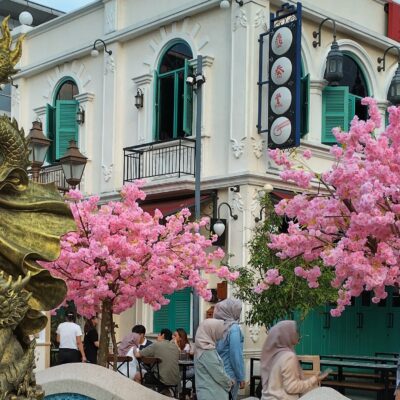Regardless of who wins Wednesday’s Indonesian presidential election, and a potential run-off in June, the new president will have to deal with an increasingly complicated international situation.
The war in Ukraine, caused by Vladimir Putin’s reckless and unprovoked invasion, shows no sign of ending as it enters its third year. China has demonstrated increasing aggressiveness in the Taiwan Strait and the South China Sea, exacerbated by growing tension with the United States. Instability besets the Middle East in the aftermath of Hamas’ attack on Israel, Israel’s military retaliation in Gaza, and the interdiction of shipping by Houthi rebels in the Red Sea (which many see as a US-Iran proxy conflict). And, closer to home, there is the civil war in Myanmar, also three-years-old and increasingly bloody.
Faced with these international developments, many of which impinge on Indonesian national interests, the new President will have his work cut out for him right on his first day in office.
Unfortunately, foreign policy has never been much of a priority for the three presidential candidates. The election campaign offered no new vision or ideas for the future direction of Indonesian foreign policy. Gone was the big picture of the likes of a “Global Maritime Fulcrum”, offered by President Joko (Jokowi) Widodo during the 2014 Presidential debate, albeit a concept that he failed to expand seriously in his two terms.
Take the example of Ganjar Pranowo, the candidate of the Indonesian Democratic Party-Struggle (PDI-P). In his presentations to the Centre for Strategic and International Studies (CSIS) in Jakarta on 7 November and during the third presidential debate on 7 January, he portrayed foreign policy as little more than an adjunct of economic policy—the primary purpose was how much it could benefit Indonesia’s economic growth.
This is not dissimilar to Jokowi’s own transactional foreign policy. After his first foreign trip in November 2014, Jokowi remarked, “What’s the point of having many friends if we only get the disadvantages? Many friends should bring many benefits.” Like Jokowi, Ganjar wants his future ambassadors to be marketeers who promote Indonesia.
The position of Prabowo Subianto, who based on credible public opinion polls is currently the frontrunner in the election, has not been markedly different. When he was asked how he would strengthen relationships with the Global South, he stressed the need for Indonesia to manage its economy well, as Indonesia’s leadership was based on how well it could showcase its success in becoming a rich country.
Throughout the debate, both Ganjar and Prabowo simply ignored the need for Indonesia to engage with, and to lead, other states, especially in Southeast Asia, the region in which Indonesia is an unofficial leader.
Anies Baswedan, who is currently polling in second place, is perhaps the most multilateralist candidate of the three. During the 7 January debate, he stressed the need for Indonesia to reach out to the Global South and to advocate an agenda in the interests of the Global South. He was the only candidate who pointed out the need for Indonesia to lead ASEAN and to work with other ASEAN countries to preserve the peace in South China Sea.
However, he shares the same weakness as the other candidates—notably, he offers no substance as to how he would achieve these ambitions. While he stated that a settlement in the South China Sea required ASEAN to build internal agreement on how to deal with threats from outside the bloc, an ASEAN consensus looks elusive. Ganjar retorted that ASEAN’s consensus-based decision-making process was too complicated and it needed to be fixed to be able to allow for quick decisions.
Left unmentioned was the biggest elephant in the room, namely that China is becoming more belligerent, especially on the South China Sea and Taiwan, and that over many decades now ASEAN has become increasingly irrelevant in the foreign policy decision-making of states in the region. Negotiations over a South China Sea Code of Conduct, which was supposed to manage territorial conflicts and reduce maritime risks, keeps dragging on with no end in sight. While ASEAN as an organisation still has its own uses and benefits for its members, how they have collectively managed the conflicts in the South China Sea and Myanmar make it clear they cannot rely on each other should push come to shove, as shown by the fact that ASEAN failed to back the Philippines’ legally validated position on its territorial dispute with China. The fact that none of Indonesia’s presidential candidates discussed ASEAN in depth—including Ganjar, who only mentioned it as a throwaway point—should give pause for thought on how seriously foreign policy is taken by all three candidates.
As global and regional challenges keep piling up, it is unfortunate that the three contenders to be Indonesia’s next president do not bring anything fresh to the table. Perhaps it is due to the format of the formal debates that does not allow the elaboration of big ideas. It might also be due to either the nature of Indonesian domestic politics—and the priority it places on internal affairs, especially economic growth—or to the fact that foreign policy is seen as a pursuit of the academic elite. Either way, foreign policy is seen as a lower-tier policy realm.
A quick glimpse at each candidate’s vision and mission statement reveals this reality. Ganjar Pranowo only devoted two very short paragraphs to foreign policy in a 66-page booklet on his 2024 vision. Prabowo Subianto devoted less than ten short paragraphs in an 88-page booklet on his 2024 vision. While Anies Baswedan discussed foreign policy the most of the three candidates, with less than five pages spent on the topic in the middle of a 148-page booklet he offered mostly a rehash of the need for Indonesia to strengthen international cooperation and to act as an important player in international forums. Essentially, there is nothing new in the booklet.
Still, the lack of attention to foreign policy among the candidates does not mean they can hide from the challenges posed by foreign policy for the next administration. Sooner or later, Indonesia will have to face these problems, and whoever wins the presidency will need to deal with them.
Yohanes Sulaiman is Associate Professor and Senior Lecturer in International Relations at Universitas Jendral Achmad Yani in Cimahi, Indonesia.
This article is part of a special co-published series on the Indonesian election led by Asialink’s Insights.
Image: Workers pass in front of billboards with pictures of three presidential candidates for the 2024 elections on 09, January 2024 in Jakarta. Credit: Wulandari Wulandari/Shutterstock.




